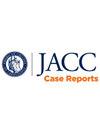支架感染导致冠状动脉瘤和冠状动脉瘤腔内瘘。
Q4 Medicine
引用次数: 0
摘要
背景:冠状动脉支架感染是一种罕见但灾难性的并发症,发生在经皮冠状动脉介入治疗(PCI)后0.3%至6%的病例中。早期诊断和手术干预是明确诊断和治疗的关键。病例总结:一名52岁男性因左旋动脉(LCx)下壁心肌梗死接受PCI治疗,使用单个西罗莫司洗脱支架。10天后因甲氧西林敏感金黄色葡萄球菌发烧。影像学显示冠状动脉摄像瘘管伴左心房附件(LAA)真菌性动脉瘤。他接受抗生素治疗,支架置入,脓肿引流,瘘管修复;然而,他出现难治性血管截瘫,术后2天死亡。讨论:冠状动脉SI需要高怀疑指数。使用多模式成像和多学科方法来诊断和管理感染是必不可少的。晚期和复杂的支架感染具有很高的死亡率。关键信息:冠状动脉SI是pci术后发热的重要鉴别诊断。需要及时诊断、多模式成像和早期干预。本文章由计算机程序翻译,如有差异,请以英文原文为准。
Stent Infection Leading to Coronary Aneurysm and Coronary Cameral Fistula
Background
Coronary stent infection (SI) is a rare but catastrophic complication, occurring in 0.3% to 6% of cases post–percutaneous coronary intervention (PCI). Early diagnosis and surgical interventions are crucial for definitive diagnosis and management.
Case Summary
A 52-year-old man underwent PCI for an inferior wall myocardial infarction to the left circumflex artery (LCx) with a single sirolimus-eluting stent. He developed a fever 10 days later due to methicillin-sensitive Staphylococcus aureus. Imaging showed a coronary cameral fistula with a left atrial appendage (LAA) mycotic aneurysm. He was treated with antibiotics, stent explantation, abscess drainage, and fistula repair; however, he developed refractory vasoplegia and died 2 days post-surgery.
Discussion
Coronary SI requires a high index of suspicion. The use of multimodality imaging and multidisciplinary approaches to diagnose and manage infection is essential. Late and complicated stent infections have a high mortality rate.
Take-Home Messages
Coronary SI is an important differential diagnosis for fever post-PCI. Prompt diagnosis, multimodality imaging, and early intervention are needed.
求助全文
通过发布文献求助,成功后即可免费获取论文全文。
去求助
来源期刊

JACC. Case reports
Medicine-Cardiology and Cardiovascular Medicine
CiteScore
1.30
自引率
0.00%
发文量
404
审稿时长
17 weeks
 求助内容:
求助内容: 应助结果提醒方式:
应助结果提醒方式:


